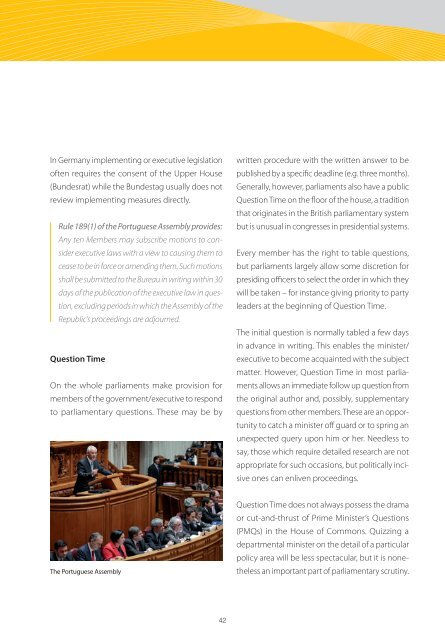Parliamentary Rules of Procedure - European Parliament - Europa
Parliamentary Rules of Procedure - European Parliament - Europa
Parliamentary Rules of Procedure - European Parliament - Europa
Create successful ePaper yourself
Turn your PDF publications into a flip-book with our unique Google optimized e-Paper software.
in Germany implementing or executive legislation<br />
<strong>of</strong>ten requires the consent <strong>of</strong> the Upper House<br />
(Bundesrat) while the Bundestag usually does not<br />
review implementing measures directly.<br />
Rule 189(1) <strong>of</strong> the Portuguese Assembly provides:<br />
Any ten Members may subscribe motions to consider<br />
executive laws with a view to causing them to<br />
cease to be in force or amending them. Such motions<br />
shall be submitted to the Bureau in writing within 30<br />
days <strong>of</strong> the publication <strong>of</strong> the executive law in question,<br />
excluding periods in which the Assembly <strong>of</strong> the<br />
Republic’s proceedings are adjourned.<br />
Question Time<br />
On the whole parliaments make provision for<br />
members <strong>of</strong> the government/executive to respond<br />
to parliamentary questions. These may be by<br />
the Portuguese Assembly<br />
42<br />
written procedure with the written answer to be<br />
published by a specific deadline (e.g. three months).<br />
Generally, however, parliaments also have a public<br />
Question Time on the floor <strong>of</strong> the house, a tradition<br />
that originates in the British parliamentary system<br />
but is unusual in congresses in presidential systems.<br />
Every member has the right to table questions,<br />
but parliaments largely allow some discretion for<br />
presiding <strong>of</strong>ficers to select the order in which they<br />
will be taken – for instance giving priority to party<br />
leaders at the beginning <strong>of</strong> Question Time.<br />
The initial question is normally tabled a few days<br />
in advance in writing. This enables the minister/<br />
executive to become acquainted with the subject<br />
matter. However, Question Time in most parliaments<br />
allows an immediate follow up question from<br />
the original author and, possibly, supplementary<br />
questions from other members. These are an opportunity<br />
to catch a minister <strong>of</strong>f guard or to spring an<br />
unexpected query upon him or her. needless to<br />
say, those which require detailed research are not<br />
appropriate for such occasions, but politically incisive<br />
ones can enliven proceedings.<br />
Question Time does not always possess the drama<br />
or cut-and-thrust <strong>of</strong> Prime Minister’s Questions<br />
(PMQs) in the House <strong>of</strong> commons. Quizzing a<br />
departmental minister on the detail <strong>of</strong> a particular<br />
policy area will be less spectacular, but it is nonetheless<br />
an important part <strong>of</strong> parliamentary scrutiny.

















